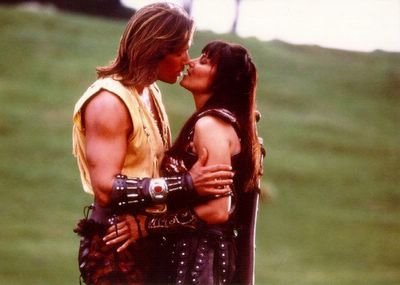Academy DaysThere’s a lot of fan debate over whether Star Trek should be going back to pre-original series days for the next film. The idea for a Starfleet Academy film featuring the young Kirk and Spock goes back to another period in which Trek’s future was in doubt after a perceived box office failure, right after
Star Trek V. Harve Bennett’s initial proposal was for a story about racial prejudice against Spock but wrapped in a flashy package: the Star Trek version of
Top Gun.
More recently William Shatner has pushed for such a concept, and is apparently writing a series of Star Trek novels with this theme. So far, he does not appear to be involved in this project.
According to one story, the Bennett proposal was revived a few years ago, but when it was sent to Rick Berman, he allowed it to be transformed into the Romulan War prequel that was recently axed. There was at least one other project that at least somebody was actively pursuing, a mixed-cast movie set in the 24th century, led by the Next Generation crew. Patrick Stewart was approached, and there were rumors about Shatner’s involvement in a Mirror Universe story.
I admit to a continuing desire for the 24th century story, though I see Q as the catalyst. Although not a lot of fans agree with me, the Mirror Universe concept worked only in its first original series appearance. (I really despised what Enterprise did with it.) But there’s no indication we’re ever going to see the Next Generation crew again.
So what about this Academy concept?
While fans speculate on who might be the younger Kirk and the new Spock, it’s worth remarking that an academy doesn’t have only students---it has teachers. The teachers in the Harry Potter series, for example, are nearly as important as the students in those stories. I expect that there will be at least one older character, a teacher, a mentor, who will be important, and I expect also it will be a big name star. The Harry Potter films again show this potential.
Looking at who Abrams has worked with before, several older stars could be possibilities: Tom Cruise (star of MI3 and the original
Top Gun as well as Speilberg’s
War of the Worlds) is an obvious choice, perhaps as a flight instructor. Bruce Willis and Mel Gibson are other stars to consider. They no longer carry movies as they once did, so being part of a Harry Potter-like ensemble, or even being the only box office star in the movie, might be attractive.
But the established actor I’d most like to see would be Harrison Ford. As mentioned above, Abrams wrote one of his best movies,
Regarding Henry, though it was utterly outside the action genre. But Ford would be a perfect mentor for a young Kirk, with his borrowed flash from his Star Wars and Indiana Jones characters. There is also Spielberg’s new association with Paramount, and Ford is close to him and his associates.
Regarding Henry is an overlooked but quite good movie, interesting in Trek terms because of its theme: a greedy mover and shaker is shot in a robbery, suffers brain damage, and begins life over again as an apparently mentally impaired person, but he turns out to be more loving and more ethical, tuned into the basic values of life.
I’ve said before that while Star Trek often dealt with the perils of power, Dr. Who often dealt with the perils of greed. Star Trek did deal with greed now and again, especially TNG, but this is an opportunity to deal with it more directly. What if resurgent greed on earth threatens the Federations principles?
Or we could see a good classroom scene, in which a professor argues for the rationale of the prime directive, of reversing the history of exploration always also meaning exploitation.
I've only mentioned male stars, but there's potential for established female stars, not just as cadets but as instructors. It will be hard for any writers to resist creating yet another beautiful woman who is quite hopelessly in love with Spock. On the other hand, it might be fun to see young Kirk as a disaster with women. The series hinted he was a more of a scholar than a young Ulysses.
We might even see as an instructor, perhaps in Federation and space law, the descendent of Denny Crane, as played by William Shatner. What a moment it would be if he watches the young Kirk and observes, I don’t know why I like that kid. And another teacher offers, maybe you see in him something of yourself.
Villains? Klingons perhaps. Though something internal to the Academy would be more imaginative.
Perhaps Abrams experience with the college series, “Felicity,” will help with creating a believable Academy. I’d be surprised if we don’t see young Kirk as a solo pilot of some fast space vehicle. I’m certainly not worried that this team will shirk the action adventure. Abrams seems capable of handling character and basic storytelling. My question for them as for anyone: are they going to make a movie with Star Trek-named characters that deletes the soul of Star Trek? Are they going to keep Star Trek in the science fiction of consciousness, or toss it whole into the easy category of commercialized unconsciousness, a big budget exploitation of 40 years of meaning as well as entertainment?
Obviously we won’t know for awhile. But we may get some clues from what Abrams and company say in the coming months.
There is also a remote possibility to consider: since these guys were so good at keeping this a secret until the recent announcement, could the Starfleet Academy scenario be an elaborate deception to keep this movie a surprise, and not what they’re planning at all?

